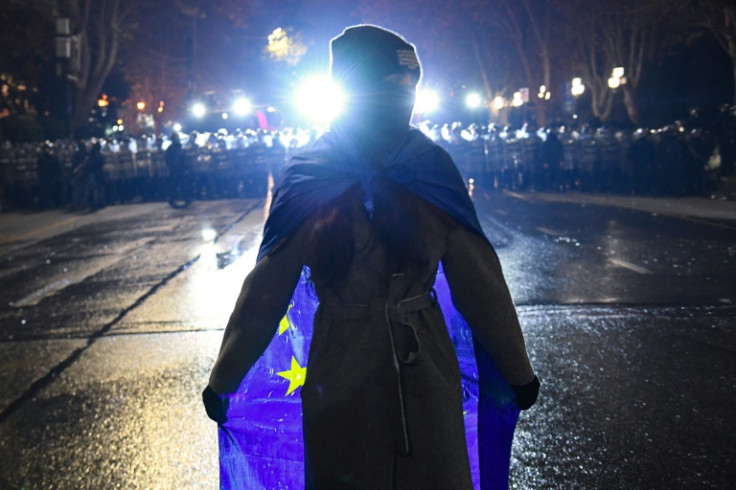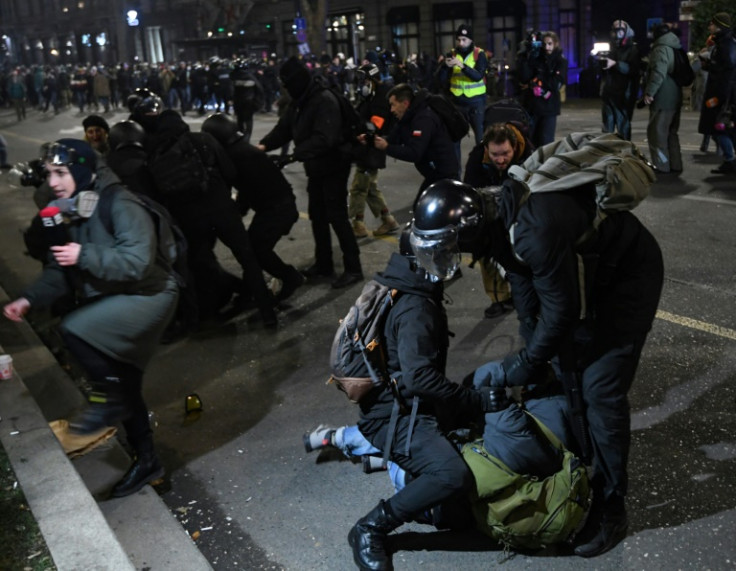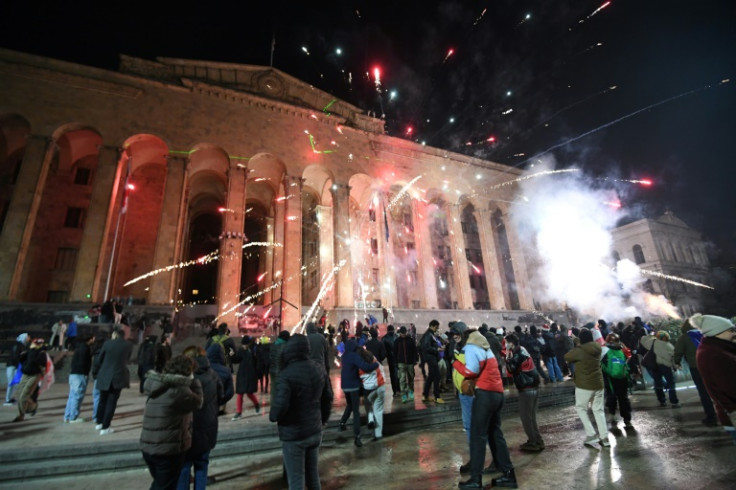
Georgian police said on Saturday they arrested dozens of people during a crackdown on pro-EU protesters who rallied Friday for a ninth consecutive day against the government decision to shelve talks on joining the bloc.
Security forces fired tear gas and water cannons to disperse the thousands of people who had gathered outside parliament in Tbilisi in the evening to demand fresh elections and a return to European integration.
"Law enforcement detained 48 individuals for disobedience to lawful police orders and petty hooliganism," the interior ministry said in a statement.
The Caucasus nation has been engulfed in turmoil since the governing Georgian Dream party declared that it had won a disputed October 26 election.
The government which critics accuse of creeping authoritarianism and of steering the country back towards Russia, last week said it would suspend talks to join the European Union, sparking a fresh wave of demonstrations.
Authorities' heavy-handed response has triggered outrage at home and mounting international condemnation.
Hundreds of arrests have been made. The country's rights ombudsman has accused the police of "torture" against those detained, with scores reporting mistreatment or showing visible injuries.
Friday night's demonstration had been largely peaceful until riot police moved in to clear the area, AFP reporters saw. Scuffles ensued with police making arrests and protesters launching fireworks at security forces.
The interior ministry said authorities dispersed the crowd after the "actions of some of the people at the protest took on a violent character," with some verbally abusing police officers and throwing stones at them.
One policeman was injured by a firework, it added.
Rights ombudsman Levan Ioseliani said police "had no legal grounds for the dispersal of a peaceful rally."
After the crackdown, smaller groups of demonstrators marched through the streets of the capital and blocked traffic on a central road, with police chasing after them and snatching some protesters.
As on several previous nights, the protest ended at dawn and is expected to resume on Saturday.
With both sides ruling out a compromise, there appeared to be no clear route out of the crisis.
The United States, France and Germany are among the Western countries to have denounced the crackdown on protests.
But the government has refused to back down.
Before Friday's rally, the prime minister had praised his security forces for "successfully neutralising the protesters' capacity for violence", after several opposition party offices were raided and opposition leaders arrested.
"We have won an important battle against liberal fascism in our country," Prime Minister Irakli Kobakhidze told a news conference, using language reminiscent of how the Kremlin in Russia targets its political opponents.
Yet, demonstrators remained defiant and rejected Kobakhidze's characterisation of the protest movement.
"The vast majority of people here are not affiliated with any parties," said Alexander Kavtaradze, 35, an academic who attended Friday's rally in Tbilisi.
"We're here because we believe in the European democratic future of this country."
Thousands have also staged anti-government rallies in the second city of Batumi on the Black Sea coast.
"People are ready to fight for as long as it takes," said Adi, 37, a winemaker, protesting in the capital.
Critics of Georgian Dream are enraged by what they call its betrayal of Tbilisi's bid for EU membership, enshrined in the constitution and supported by around 80 percent of the population.
Several ambassadors, a deputy foreign minister and other officials have resigned over the suspension of EU talks.
Georgian Dream, in power for more than a decade, has advanced controversial legislation in recent years, targeting civil society and independent media and curbing LGBTQ rights.
Brussels warned such policies were incompatible with EU membership, while domestic critics accuse the government of copying Russia's playbook.










